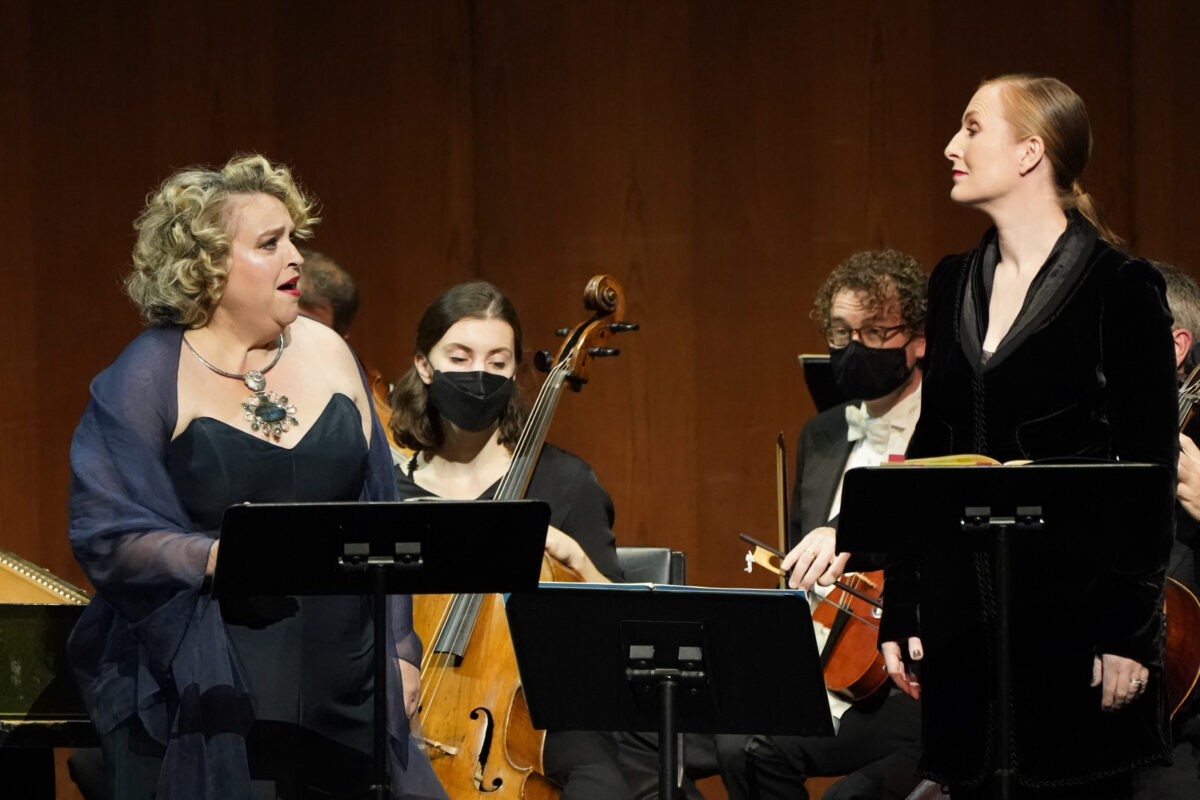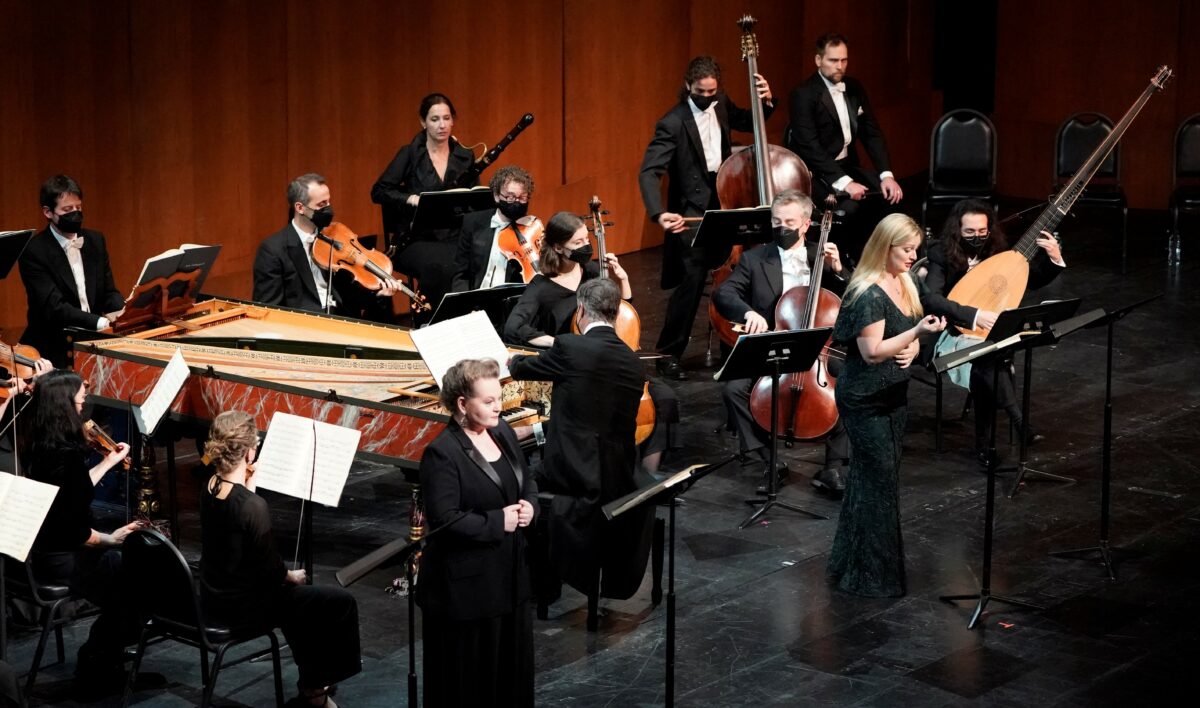“Now I want Spirits to enforce, art to enchant,…” William Shakespeare, The Tempest
Scarcely into the second act of Alcina—the third of Handel’s operas based on material from Ariosto’s Orlando Furioso (fourth if you count the not-unrelated Rinaldo)—you can feel the collective weight of the characters’ anger, frustration, regret, remorse, vengeful bitterness, and plain fury crashing down all around them, and sweeping the audience up along with them (even in this slightly pared-down concert performance), in the English Concert’s spare, but sonorous and richly articulated orchestration with period instruments (including theorbo, a kind of Renaissance bass lute—played by Sergio Bucheli). It’s really the weight of an entire legacy of war, romance, betrothal and betrayal (which begin to look like two sides of the same coin). (Odd that the legacy invoked here comes down to a single prop—a ‘magic ring’—but then the entire opera itself is drawn from just a few episodes in Ariosto’s epic poem.)
The ring isn’t exactly the ‘McGuffin’ here (as Alfred Hitchcock might have put it), but it is a kind of switch—the key to the illusion and more specifically, isolation at the center of the enchanted island reigned over by the mysterious siren/queen/sorceress-magician (but really more simply put, illusionist), Alcina. Although it’s not clearly articulated in this abridged concert version of the opera, the springboard for the drama really begins with Bradamante (Elizabeth DeShong), whose betrothed Saracen lover, Ruggiero (Ariosto crossed lines the authors of the original Chanson de Roland never dreamed of) has somehow wandered onto Alcina’s island. Bradamante has been on something of a warpath of her own searching far and wide for him, and accompanied by her former tutor, Melisso (to die for—Wojtek Gierlach—outstanding in the role), arrives at the island in full armor, passing herself off as her brother (presumably an actual Carolingian paladin), Ricciardo.
Handel keeps the pace brisk even as the action (staged or not) is fairly static, with the characters alternately swooning with fresh sexual/romantic attractions or pining from their absence, lamenting past inattention, faithlessness or, well, ‘distractions’, or furiously plotting revenge. Alcina (Karina Gauvin) is the master emotional shape-shifter here, effortlessly segueing from romantic lamentation to regal resolve and cries for vengeance. Her sister, Morgana’s no slouch in this department, either; except that she doesn’t waste too much time on the romantic longueurs. She’s open to and open about what she likes (and Alcina’s ‘island’ has a way of running short of available companions), scarcely giving a second thought to her former lovers’ feelings. (She’s a sorceress, too, after all; so isn’t she entitled? Soprano Lucy Crowe made the most of Handel’s often sinuous lines—the music itself a simile for ‘Cupid’s snares’.) Attracted to Bradamante in her road warrior disguise, she dismisses Oronte (Alek Shrader—a beautifully modulated performance) and their prior vows with a shrug—‘a dry wind has blown them away.’ She is no less dismissive late in Act II, even as the island’s grand illusion is blowing up around them all, insisting, ‘I’m free’ and doesn’t need his ‘pardon’ or forgiveness. (“Libera son, né chieggo a te perdono.”)
If Handel (and presumably his librettist collaborators—the opera was based on material from an older Italian opera by Riccardo Broschi) has made Alcina the center of what is really Bradamante’s drama, Ruggiero (played with considerable flair by Paula Murrihy), her cross-culture would-be lover, becomes a kind of stand-in for the audience—at sea in a world he can scarcely recognize as part of his own, a sucker for a good magic trick, torn between prior loyalties and promises and the fresh but false promise of an illusion too good to be true. Part of the delight of Ruggiero’s role—part and parcel with Handel’s glittering music—is his bedazzlement with the illusions on all sides—of his past, his obligations, his desires, his physical actuality—that he can scarcely shake off. The audience is sighing right there with him—‘get a grip!’ But we’re a bit dazzled, too.

(Photo Credit: Lawrence K. Ho)
Alcina—which in its original Broschi incarnation was titled, L’isola d’Alcina—has something in common with another classic ‘island’ drama—Shakespeare’s The Tempest. In both, regal (or at least aristocratic) magicians manipulate romantic or tenuously romantic liaisons around them to some advantage. In both ‘masques’ contend with ‘anti-masques’—in that all the players have in some fashion disguised themselves, whether in their persons and personalities, their roles, or motivations, all ‘playing out’ their games. In both, the magician-lords have placed themselves on a kind of promontory at the center of a labyrinth of their own making. Prospero sees his way clear to extricating himself from island and illusion (notwithstanding an array of goblin-magicians he himself contends with); where Alcina is all but destroyed with her magic.
Alcina has a lofty reputation in the Handel canon, and there’s no denying its riches—though I would be pressed to give it more deference than to any of a half-dozen of his other operas (at least—not excluding Orlando and Rinaldo). But as its second act unfolded last Tuesday evening at the Dorothy Chandler Pavilion, I was struck by its resonance with the moment—with the each of us and the worlds swirling around us emerging shakily from their respective ‘labyrinths’, in full view of the chaos wrought by our own past illusions, bedazzlements and betrayals (including the betrayals humanity seems to continually force upon itself by its unquenchable thirst for vengeance). We have to insist (like Alcina?) that there’s ‘tempo ancora’; but ‘chi scopre al mio pensiero se tradito pur son, o s’odo il vero?’—who navigates the way between ‘truth and betrayal’? The English Concert and soloists could not fail to enchant with the art of their well-wrought performance (in addition to Bucheli’s remarkable playing, the woodwinds were particularly outstanding); but for an otherwise enraptured audience, that final ‘indulgence’ sought by its characters seemed far away indeed.


